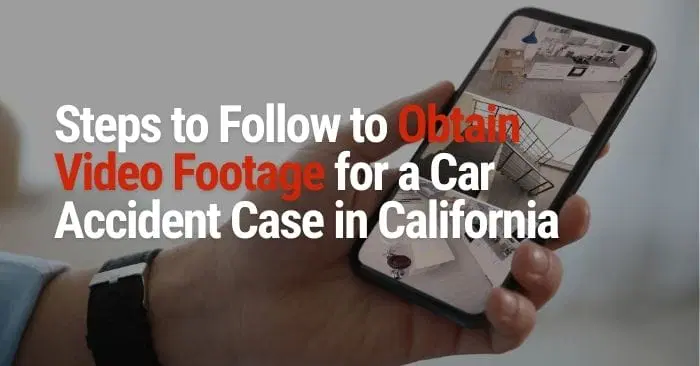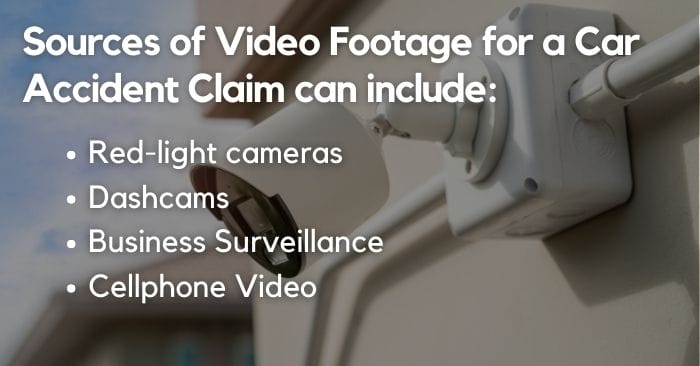
How to Obtain a Traffic Camera Video of a Car Accident in California
Legally reviewed by: Jessica Anvar Stotz, JD, MBA
The best way to obtain traffic camera video footage of a car accident in California is to promptly contact the California Department of Transportation or local law enforcement agencies. You will need to submit a formal request and comply with any legal procedures or fees involved. Please note that traffic camera footage is typically retained for a limited period- so you will need to act quickly!
Here, we outline key steps and tips to help you obtain the video footage you need:
- Identify Your Sources: Determine where the footage might be available. This could be traffic cameras, security cameras, or personal devices.
- Request Access: Depending on the source, you may need to request access to the footage. This could involve contacting the relevant authorities or individuals.
- Follow Legal Procedures: Ensure you are complying with all legal requirements and privacy laws when obtaining and using the footage.
- Verify the Footage: Once obtained, verify the authenticity and relevance of the footage to your needs.
- Store and Backup: Safely store and backup the footage to prevent loss.
Remember, time is of the essence as traffic camera footage is typically retained for a limited period.
Are There Any Jurisdictional Guidelines I Have to Follow?
Yes, there are several jurisdictional guidelines you need to follow when obtaining video footage in California, such as:
| Guideline | Description |
| Privacy Laws | Justify invasion of privacy for security or business purposes with a reasonable expectation of privacy. |
| Eavesdropping Laws | Recording or eavesdropping on confidential communication is forbidden (California Penal Code Sec. 632). |
| Request or Subpoena | Obtain footage through a request or subpoena based on the owning organization’s policy. |
| Consent for Audio Recording | Consent required for audio recording, as per California law. |
| Courtroom Recordings | Advance permission needed from the judge for recording in a courtroom. |
Remember, these are general guidelines and may not cover all situations.
Can Lawyers Obtain Car Accident Footage Faster Than Others?
Yes, lawyers can often obtain car accident footage more quickly because they have experience in dealing with such matters and know the correct procedures to follow. They can assist in obtaining video footage of the accident as quickly as possible. It is common for establishments to delete previously recorded footage to make room for new recordings. An attorney can immediately send a letter to the establishment or authorities asking them to preserve the footage.
Moreover, businesses might voluntarily provide their surveillance videos, but there could be instances where your lawyer must issue a subpoena to obtain them. Given that security videos are typically erased a few weeks post-recording, you should try to obtain this footage promptly.
Are There Any Time Limits or Retention Policies?
Yes, there are time limits and retention policies for traffic camera footage. These can vary depending on the jurisdiction and the specific policies of the entities that hold the footage. Here are some general guidelines:
- Duration of Storage: Traffic cameras typically store footage for 30 to 90 days before it is deleted or overwritten. In some jurisdictions like Los Angeles, traffic camera footage is stored for up to five years.
- Legal Holds: If there is an ongoing investigation or legal proceeding, the footage may be kept indefinitely.
- Industry Standards: Certain industries, like casinos and banks, may store security footage for a minimum of 6 months due to industry standards and regulations.
- Requests for Footage: Requests for video footage should generally be responded to within ten business days.
- Recorded Incidents: Video segments with recorded incidents must be kept for at least 120 days, or if a legal hold is in place, until the case is closed.
It is always a good idea to consult a legal professional to ensure you comply with all relevant laws and regulations.
Are There Any Instances Where Traffic Footage is Not Attainable?
Yes, there are instances where traffic footage may not be attainable:
- Limited Storage Duration: Traffic cameras typically store footage for a limited period before it is overwritten. If the request for footage is made after this period, the footage may no longer be available.
- Technical Issues: There could be technical issues with the cameras or the storage devices that result in loss of footage.
- Camera Coverage: Not all areas are covered by traffic cameras. If an incident occurred in an area not covered by cameras, footage would not be available.
- Privacy Laws: In some cases, privacy laws may restrict access to certain video footage.
- Uncooperative Property Owners: If the footage is held by private property owners, they may refuse to release it.
- Lack of Resources: In some cases, the entity holding the footage may lack the resources to process requests for footage.
Other Types of Evidence You Can Use for Your Accident
In addition to traffic camera footage, there are several other types of evidence that can be crucial in documenting the details of your accident and establishing liability:
- Photographs: Photos of the accident scene, vehicle damage, and any visible injuries can provide valuable context and proof of the incident.
- Witness Testimonies: Statements from people who witnessed the accident can help corroborate your account of the event.
- Police Reports: If law enforcement was called to the scene, they would have filed a report detailing their observations and any citations issued.
- Medical Records: Documentation of your injuries and treatment can demonstrate the severity of the accident’s impact on your health.
- Dashcam Footage: If you or another vehicle involved in the accident had a dashcam running, this footage could provide a first-hand account of the incident.
- Cell Phone Records: In cases where distracted driving is suspected, an examination of their mobile phone activity can be used to establish whether a driver was texting or on a call at the time of the accident.
- Black Box Data: Many modern vehicles are equipped with a black box, or Event Data Recorder (EDR), which records information about the vehicle’s speed, brake usage, and other details in the moments before a collision.
The relevance and admissibility of these types of evidence can vary depending on the specifics of your case and local laws. We highly recommend consulting with a legal professional to ensure that you are gathering and using evidence effectively.

Having Trouble Receiving Your Traffic Cam Footage?
Obtaining traffic camera footage can be incredibly confusing and time-consuming, if you are having trouble receiving your traffic cam footage in Southern California, don’t worry – you’re not alone. People regularly encounter hurdles in this process, the legal procedure itself is far from straightforward. At LawLinq, we have a network of experienced attorneys who can help expedite this process. Here’s how:
- Understanding the Process: Our affiliated attorneys are well-versed in the procedures and legalities involved in obtaining traffic camera footage. They can guide you through the process, helping you understand what to expect.
- Expedited Requests: Lawyers often have established relationships with law enforcement and local authorities, which can help speed up the process of obtaining the footage.
- Legal Representation: If your request for footage is denied, our referred attorneys can provide legal representation, helping you appeal the decision or explore other legal avenues to obtain the footage.
- Preservation Letters: Our network attorneys can send a preservation letter on your behalf, asking the relevant authorities to save the footage before it gets deleted or overwritten.
- Compliance with Laws: Our attorneys ensure that all requests and uses of the footage comply with state and federal privacy laws, protecting you from potential legal issues down the line.
Time is of the essence when it comes to obtaining traffic camera footage. If you are struggling to get the footage you need, do not hesitate to reach out to LawLinq. We are here to connect you with the top rated personal injury attorneys when you need it most, at zero cost. To learn more, contact LawLinq today.


